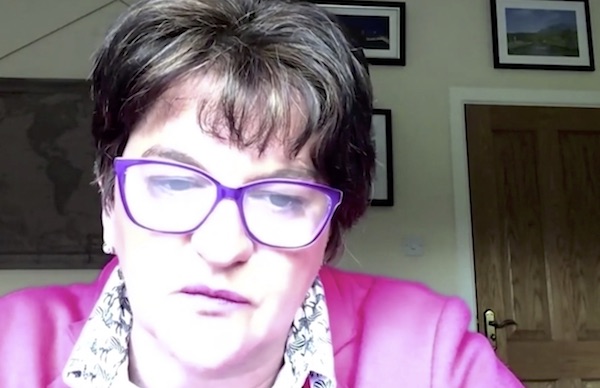
The inability of the Six-County Executive at Stormont to govern effectively has been highlighted by the announcement on Friday of a hard ‘lockdown’ for six weeks as well as a week-long 8pm curfew to begin on St Stephen’s Day.
The u-turn came about as hospitals were overwhelmed by the rampant Covid-19 virus across the North and the 26 County government had to send parademics over the border to assist.
Weeks of unionist vetoes, partly motivated by sectarian hate, have been abandoned entirely, with the DUP now backing one of the harshest lockdown regimes in Britain or Ireland. But in a desperate deflection, the DUP leader Arlene Foster sought to blame “society as a whole” (and, once again, a republican funeral in June) for the spiralling number of Covid cases.
“We do find ourselves in a particularly bad place, I very much regret that that is the case and it’s a failure of society as a whole that we have had to introduce these restrictions in the draconian way that they are coming in on Boxing night,” she said.
Foster inevitably singled out Sinn Féin for blame, pointing to the attendance of senior SF figures at Bobby Storey’s funeral in June. More than a thousand people turned out to mourn the IRA veteran, with some of them failing to observe social distancing or wear masks.
Criticism of the funeral by the loyalist media in the North, amplified by right-wing politicians in the South, was long used as justification by the DUP for its failure to act. It completely ignored public health advice around lockdown decisions last month and insisted on few restrictions on economic activity.
“Of course before the end of June last year compliance in Northern Ireland was very good and in fact we were the envy of other colleagues in the United Kingdom. But at the end of June, one party, Sinn Féin, decided whilst they made the laws they were also above the laws,” Foster said on Friday.
“And now we find ourselves in a situation where messaging is very difficult. We’ve seen a breakdown in compliance and I very, very much regret that to be the case.”
In a more upbeat statement, Deputy First Minister, Sinn Féin’s Michelle O’Neill, insisted the Executive was showing a united front.
“There’s a collective approach to this and the executive as a whole agrees that we needed to intervene,” she said. She noted the new lockdown was introduced with the agreement of all parties.
“Last night at the Executive meeting, the length of interventions, the measures that needed to be taken, there was five-party agreement that this is the right approach,” she said.
Case numbers had continued to rise despite new restrictions over the past two weeks. On Tuesday, queues of ambulances were witnessed at accident and emergency departments (EDs) as patients were treated in car parks due to a lack of capacity inside the hospitals.
At one point 17 ambulances containing patients were lined up outside the ED at Antrim Area Hospital.
The Ambulance Service in the North announced that paramedics from the 26 Counties are set to bolster their numbers this weekend. Michael Bloomfield, chief executive of the Northern Ireland Ambulance Service (NIAS), described the move as “unusual” and reflected the pressure they are under.
But there were hopes the cross-border action could finally presage a shift to an all-Ireland approach to tackling the disease and end the disastrous fragmentation of the island’s response.
“This practical co-operation is very welcome indeed,” wrote international epidemic expert Professor Gabriel Scally.
“More integration of effort and development of a common strategy to keep everyone on the island safe from Covid-19 for the next six months would be wonderful”.
![[Irish Republican News]](https://republican-news.org/graphics/title_gifs/rn.gif)
![[Irish Republican News]](https://republican-news.org/graphics/title_gifs/harp.gif)

